Budgeting for SMEs and Sponsorship: A Comparative Analysis Report
VerifiedAdded on 2023/06/07
|14
|4021
|146
Report
AI Summary
This report provides a comparative analysis of two studies examining budgeting practices in different organizational contexts: small and medium-sized enterprises (SMEs) and sponsorship management. It explores the roles of budgeting in planning, controlling, communicating, coordinating, motivating, and evaluating performance. The report highlights the similarities and differences in the findings of the two studies, particularly regarding the relationship between budgeting and organizational performance, the importance of budget emphasis in SMEs, and the influence of factors like organizational size, risk, and trust on budgetary roles in sponsorship contexts. The lessons learned emphasize the importance of aligning budgetary roles with organizational activities, effective planning and forecasting, and motivating managers. Ultimately, the report concludes that budgeting plays an integral role in an organization's overall performance and management accounting practices.

UNIT:
NAME:
DATE:
WORD COUNT: 2787 Words
NAME:
DATE:
WORD COUNT: 2787 Words
Paraphrase This Document
Need a fresh take? Get an instant paraphrase of this document with our AI Paraphraser
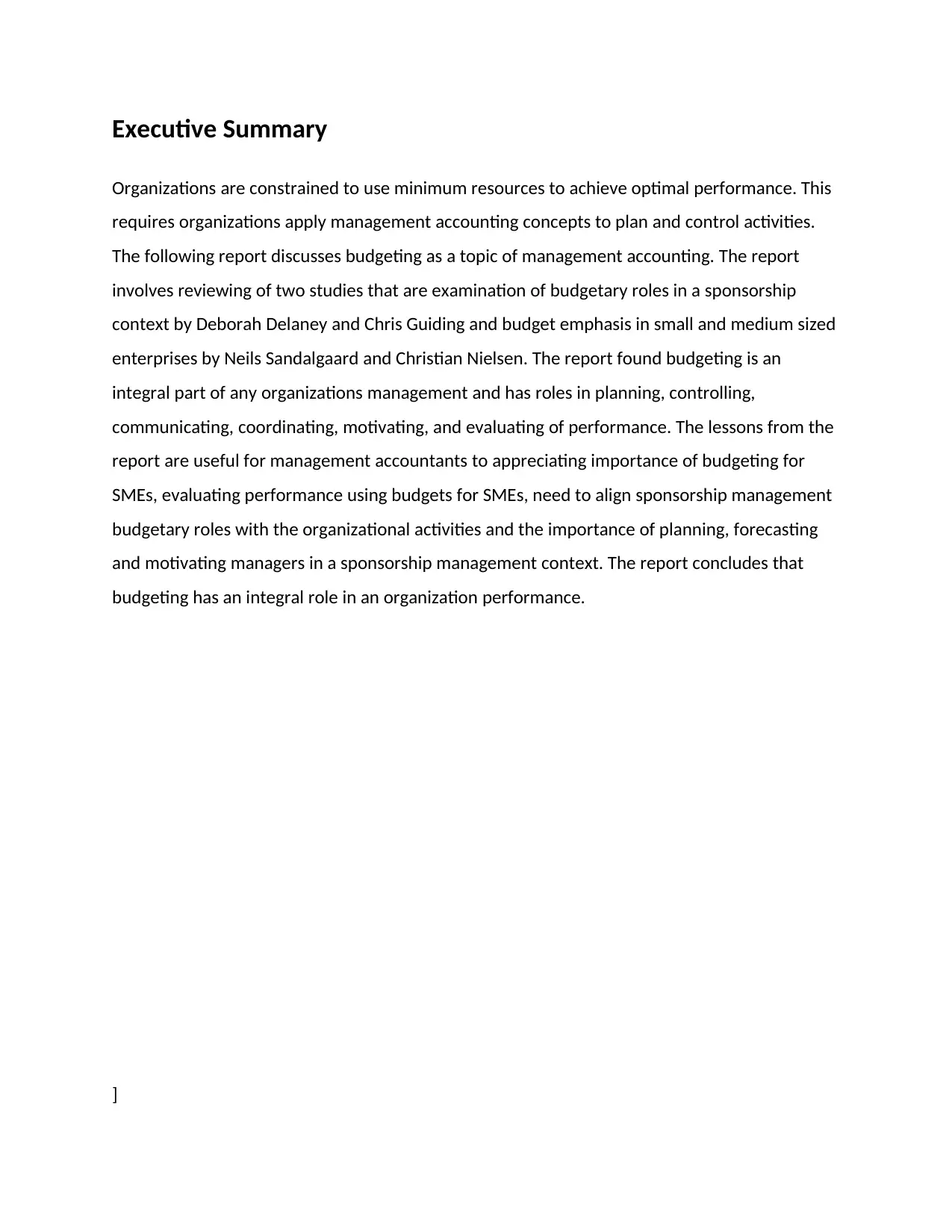
Executive Summary
Organizations are constrained to use minimum resources to achieve optimal performance. This
requires organizations apply management accounting concepts to plan and control activities.
The following report discusses budgeting as a topic of management accounting. The report
involves reviewing of two studies that are examination of budgetary roles in a sponsorship
context by Deborah Delaney and Chris Guiding and budget emphasis in small and medium sized
enterprises by Neils Sandalgaard and Christian Nielsen. The report found budgeting is an
integral part of any organizations management and has roles in planning, controlling,
communicating, coordinating, motivating, and evaluating of performance. The lessons from the
report are useful for management accountants to appreciating importance of budgeting for
SMEs, evaluating performance using budgets for SMEs, need to align sponsorship management
budgetary roles with the organizational activities and the importance of planning, forecasting
and motivating managers in a sponsorship management context. The report concludes that
budgeting has an integral role in an organization performance.
]
Organizations are constrained to use minimum resources to achieve optimal performance. This
requires organizations apply management accounting concepts to plan and control activities.
The following report discusses budgeting as a topic of management accounting. The report
involves reviewing of two studies that are examination of budgetary roles in a sponsorship
context by Deborah Delaney and Chris Guiding and budget emphasis in small and medium sized
enterprises by Neils Sandalgaard and Christian Nielsen. The report found budgeting is an
integral part of any organizations management and has roles in planning, controlling,
communicating, coordinating, motivating, and evaluating of performance. The lessons from the
report are useful for management accountants to appreciating importance of budgeting for
SMEs, evaluating performance using budgets for SMEs, need to align sponsorship management
budgetary roles with the organizational activities and the importance of planning, forecasting
and motivating managers in a sponsorship management context. The report concludes that
budgeting has an integral role in an organization performance.
]
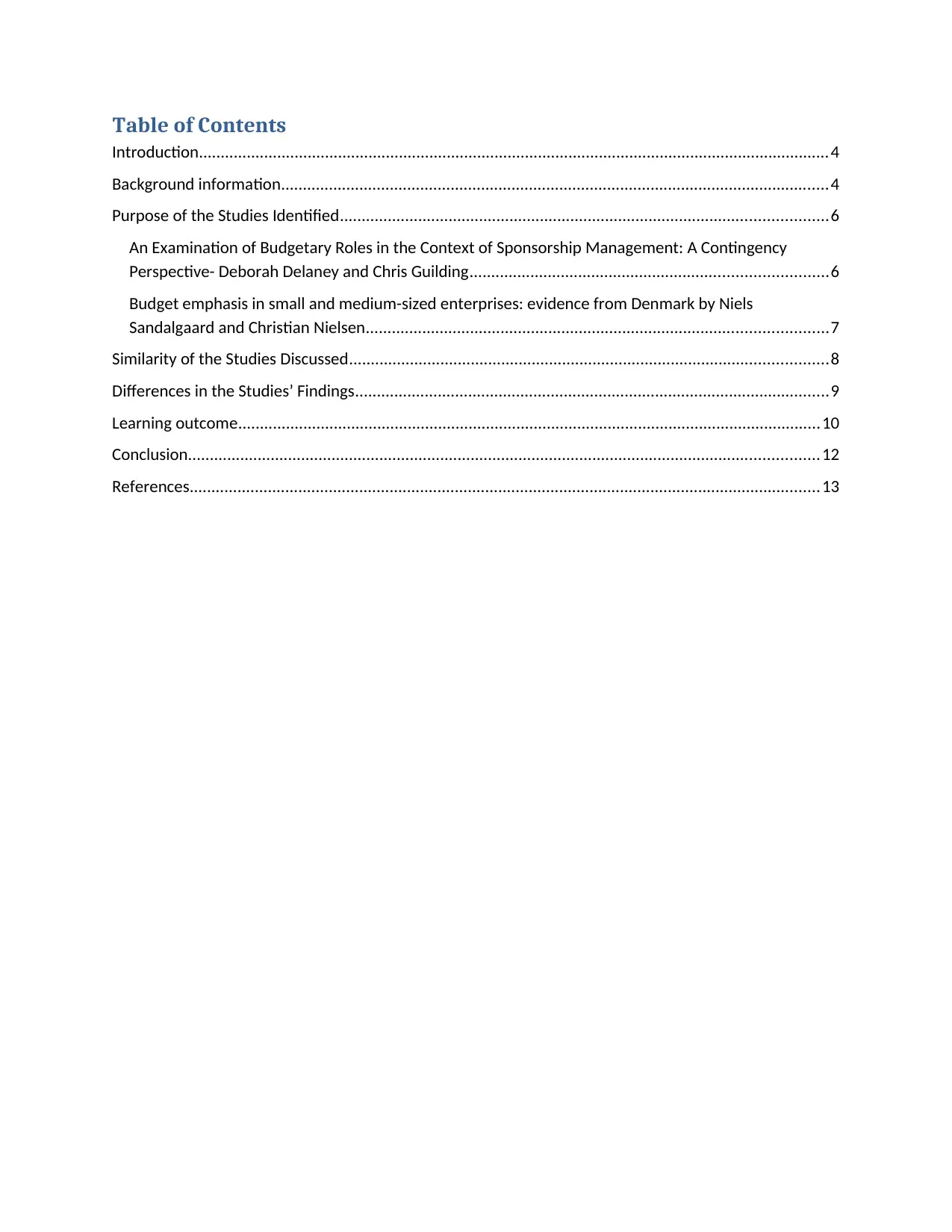
Table of Contents
Introduction.................................................................................................................................................4
Background information..............................................................................................................................4
Purpose of the Studies Identified................................................................................................................6
An Examination of Budgetary Roles in the Context of Sponsorship Management: A Contingency
Perspective- Deborah Delaney and Chris Guilding..................................................................................6
Budget emphasis in small and medium-sized enterprises: evidence from Denmark by Niels
Sandalgaard and Christian Nielsen..........................................................................................................7
Similarity of the Studies Discussed..............................................................................................................8
Differences in the Studies’ Findings.............................................................................................................9
Learning outcome......................................................................................................................................10
Conclusion.................................................................................................................................................12
References.................................................................................................................................................13
Introduction.................................................................................................................................................4
Background information..............................................................................................................................4
Purpose of the Studies Identified................................................................................................................6
An Examination of Budgetary Roles in the Context of Sponsorship Management: A Contingency
Perspective- Deborah Delaney and Chris Guilding..................................................................................6
Budget emphasis in small and medium-sized enterprises: evidence from Denmark by Niels
Sandalgaard and Christian Nielsen..........................................................................................................7
Similarity of the Studies Discussed..............................................................................................................8
Differences in the Studies’ Findings.............................................................................................................9
Learning outcome......................................................................................................................................10
Conclusion.................................................................................................................................................12
References.................................................................................................................................................13
⊘ This is a preview!⊘
Do you want full access?
Subscribe today to unlock all pages.

Trusted by 1+ million students worldwide
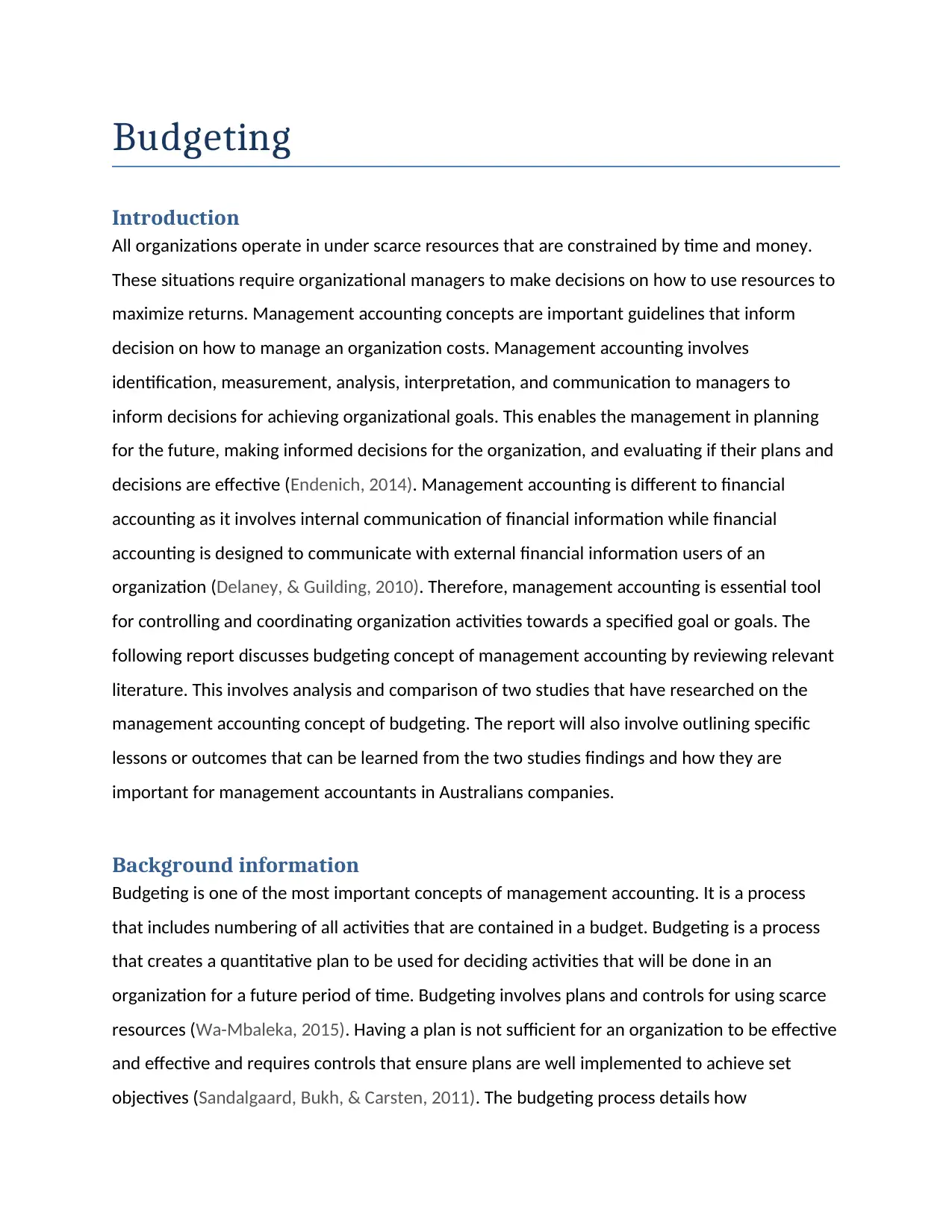
Budgeting
Introduction
All organizations operate in under scarce resources that are constrained by time and money.
These situations require organizational managers to make decisions on how to use resources to
maximize returns. Management accounting concepts are important guidelines that inform
decision on how to manage an organization costs. Management accounting involves
identification, measurement, analysis, interpretation, and communication to managers to
inform decisions for achieving organizational goals. This enables the management in planning
for the future, making informed decisions for the organization, and evaluating if their plans and
decisions are effective (Endenich, 2014). Management accounting is different to financial
accounting as it involves internal communication of financial information while financial
accounting is designed to communicate with external financial information users of an
organization (Delaney, & Guilding, 2010). Therefore, management accounting is essential tool
for controlling and coordinating organization activities towards a specified goal or goals. The
following report discusses budgeting concept of management accounting by reviewing relevant
literature. This involves analysis and comparison of two studies that have researched on the
management accounting concept of budgeting. The report will also involve outlining specific
lessons or outcomes that can be learned from the two studies findings and how they are
important for management accountants in Australians companies.
Background information
Budgeting is one of the most important concepts of management accounting. It is a process
that includes numbering of all activities that are contained in a budget. Budgeting is a process
that creates a quantitative plan to be used for deciding activities that will be done in an
organization for a future period of time. Budgeting involves plans and controls for using scarce
resources (Wa-Mbaleka, 2015). Having a plan is not sufficient for an organization to be effective
and effective and requires controls that ensure plans are well implemented to achieve set
objectives (Sandalgaard, Bukh, & Carsten, 2011). The budgeting process details how
Introduction
All organizations operate in under scarce resources that are constrained by time and money.
These situations require organizational managers to make decisions on how to use resources to
maximize returns. Management accounting concepts are important guidelines that inform
decision on how to manage an organization costs. Management accounting involves
identification, measurement, analysis, interpretation, and communication to managers to
inform decisions for achieving organizational goals. This enables the management in planning
for the future, making informed decisions for the organization, and evaluating if their plans and
decisions are effective (Endenich, 2014). Management accounting is different to financial
accounting as it involves internal communication of financial information while financial
accounting is designed to communicate with external financial information users of an
organization (Delaney, & Guilding, 2010). Therefore, management accounting is essential tool
for controlling and coordinating organization activities towards a specified goal or goals. The
following report discusses budgeting concept of management accounting by reviewing relevant
literature. This involves analysis and comparison of two studies that have researched on the
management accounting concept of budgeting. The report will also involve outlining specific
lessons or outcomes that can be learned from the two studies findings and how they are
important for management accountants in Australians companies.
Background information
Budgeting is one of the most important concepts of management accounting. It is a process
that includes numbering of all activities that are contained in a budget. Budgeting is a process
that creates a quantitative plan to be used for deciding activities that will be done in an
organization for a future period of time. Budgeting involves plans and controls for using scarce
resources (Wa-Mbaleka, 2015). Having a plan is not sufficient for an organization to be effective
and effective and requires controls that ensure plans are well implemented to achieve set
objectives (Sandalgaard, Bukh, & Carsten, 2011). The budgeting process details how
Paraphrase This Document
Need a fresh take? Get an instant paraphrase of this document with our AI Paraphraser
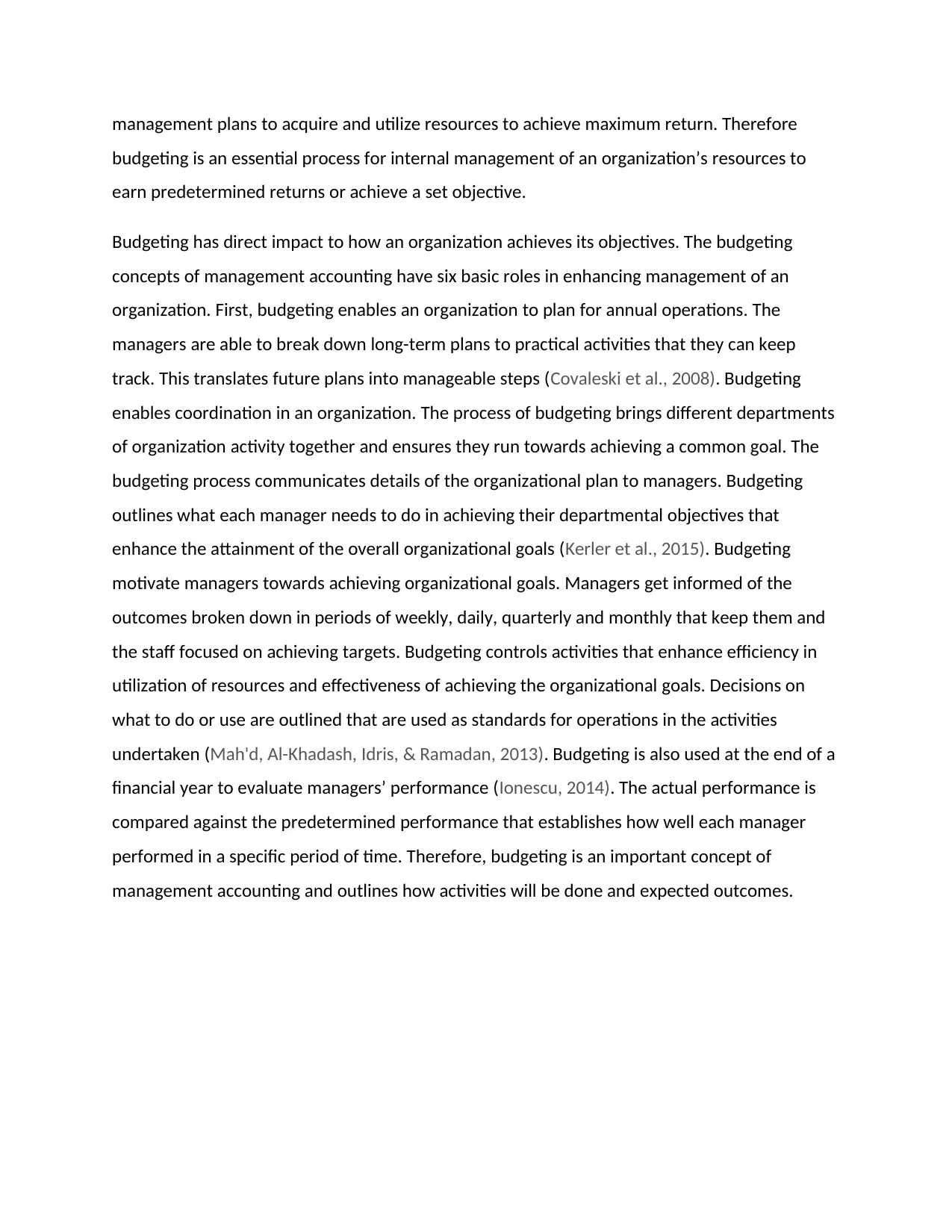
management plans to acquire and utilize resources to achieve maximum return. Therefore
budgeting is an essential process for internal management of an organization’s resources to
earn predetermined returns or achieve a set objective.
Budgeting has direct impact to how an organization achieves its objectives. The budgeting
concepts of management accounting have six basic roles in enhancing management of an
organization. First, budgeting enables an organization to plan for annual operations. The
managers are able to break down long-term plans to practical activities that they can keep
track. This translates future plans into manageable steps (Covaleski et al., 2008). Budgeting
enables coordination in an organization. The process of budgeting brings different departments
of organization activity together and ensures they run towards achieving a common goal. The
budgeting process communicates details of the organizational plan to managers. Budgeting
outlines what each manager needs to do in achieving their departmental objectives that
enhance the attainment of the overall organizational goals (Kerler et al., 2015). Budgeting
motivate managers towards achieving organizational goals. Managers get informed of the
outcomes broken down in periods of weekly, daily, quarterly and monthly that keep them and
the staff focused on achieving targets. Budgeting controls activities that enhance efficiency in
utilization of resources and effectiveness of achieving the organizational goals. Decisions on
what to do or use are outlined that are used as standards for operations in the activities
undertaken (Mah'd, Al-Khadash, Idris, & Ramadan, 2013). Budgeting is also used at the end of a
financial year to evaluate managers’ performance (Ionescu, 2014). The actual performance is
compared against the predetermined performance that establishes how well each manager
performed in a specific period of time. Therefore, budgeting is an important concept of
management accounting and outlines how activities will be done and expected outcomes.
budgeting is an essential process for internal management of an organization’s resources to
earn predetermined returns or achieve a set objective.
Budgeting has direct impact to how an organization achieves its objectives. The budgeting
concepts of management accounting have six basic roles in enhancing management of an
organization. First, budgeting enables an organization to plan for annual operations. The
managers are able to break down long-term plans to practical activities that they can keep
track. This translates future plans into manageable steps (Covaleski et al., 2008). Budgeting
enables coordination in an organization. The process of budgeting brings different departments
of organization activity together and ensures they run towards achieving a common goal. The
budgeting process communicates details of the organizational plan to managers. Budgeting
outlines what each manager needs to do in achieving their departmental objectives that
enhance the attainment of the overall organizational goals (Kerler et al., 2015). Budgeting
motivate managers towards achieving organizational goals. Managers get informed of the
outcomes broken down in periods of weekly, daily, quarterly and monthly that keep them and
the staff focused on achieving targets. Budgeting controls activities that enhance efficiency in
utilization of resources and effectiveness of achieving the organizational goals. Decisions on
what to do or use are outlined that are used as standards for operations in the activities
undertaken (Mah'd, Al-Khadash, Idris, & Ramadan, 2013). Budgeting is also used at the end of a
financial year to evaluate managers’ performance (Ionescu, 2014). The actual performance is
compared against the predetermined performance that establishes how well each manager
performed in a specific period of time. Therefore, budgeting is an important concept of
management accounting and outlines how activities will be done and expected outcomes.
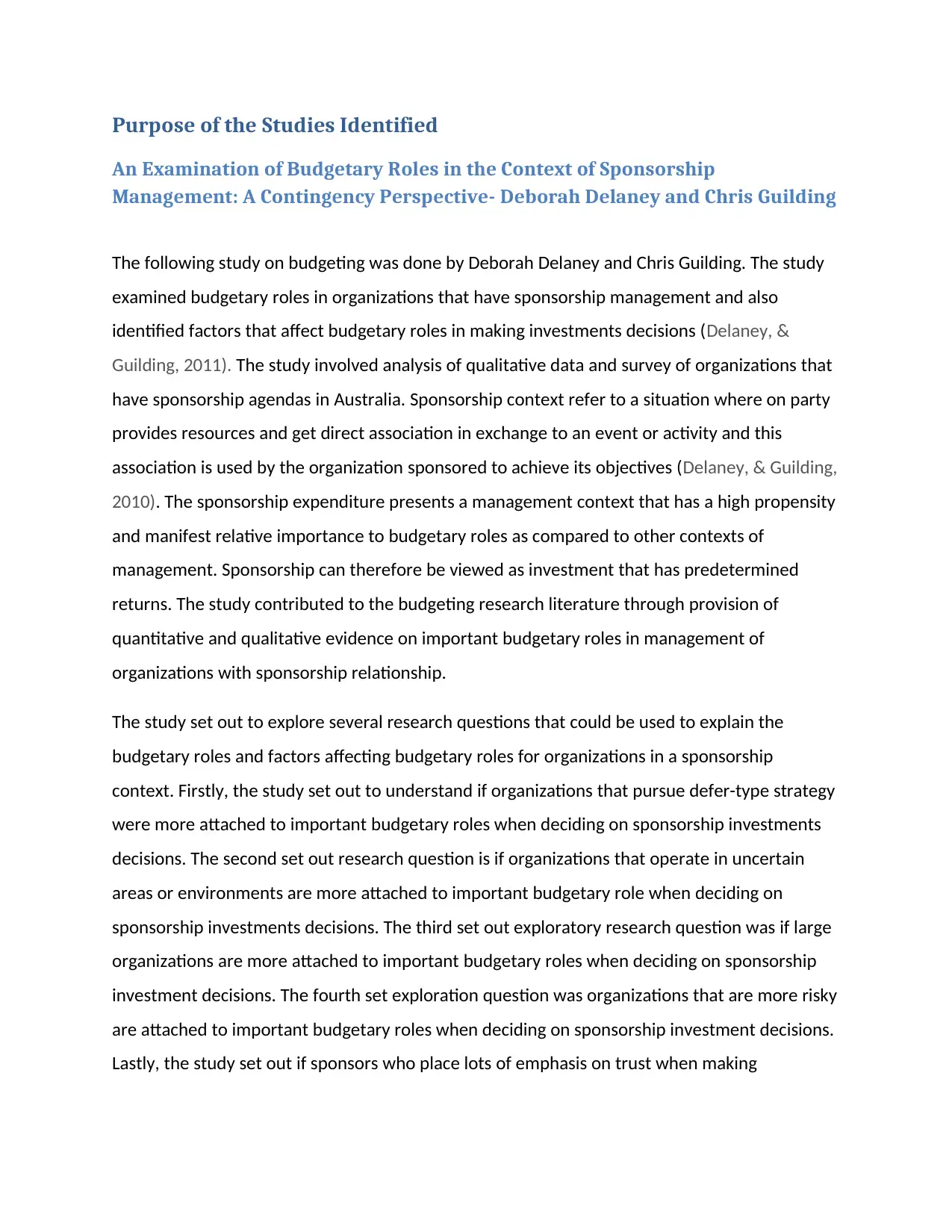
Purpose of the Studies Identified
An Examination of Budgetary Roles in the Context of Sponsorship
Management: A Contingency Perspective- Deborah Delaney and Chris Guilding
The following study on budgeting was done by Deborah Delaney and Chris Guilding. The study
examined budgetary roles in organizations that have sponsorship management and also
identified factors that affect budgetary roles in making investments decisions (Delaney, &
Guilding, 2011). The study involved analysis of qualitative data and survey of organizations that
have sponsorship agendas in Australia. Sponsorship context refer to a situation where on party
provides resources and get direct association in exchange to an event or activity and this
association is used by the organization sponsored to achieve its objectives (Delaney, & Guilding,
2010). The sponsorship expenditure presents a management context that has a high propensity
and manifest relative importance to budgetary roles as compared to other contexts of
management. Sponsorship can therefore be viewed as investment that has predetermined
returns. The study contributed to the budgeting research literature through provision of
quantitative and qualitative evidence on important budgetary roles in management of
organizations with sponsorship relationship.
The study set out to explore several research questions that could be used to explain the
budgetary roles and factors affecting budgetary roles for organizations in a sponsorship
context. Firstly, the study set out to understand if organizations that pursue defer-type strategy
were more attached to important budgetary roles when deciding on sponsorship investments
decisions. The second set out research question is if organizations that operate in uncertain
areas or environments are more attached to important budgetary role when deciding on
sponsorship investments decisions. The third set out exploratory research question was if large
organizations are more attached to important budgetary roles when deciding on sponsorship
investment decisions. The fourth set exploration question was organizations that are more risky
are attached to important budgetary roles when deciding on sponsorship investment decisions.
Lastly, the study set out if sponsors who place lots of emphasis on trust when making
An Examination of Budgetary Roles in the Context of Sponsorship
Management: A Contingency Perspective- Deborah Delaney and Chris Guilding
The following study on budgeting was done by Deborah Delaney and Chris Guilding. The study
examined budgetary roles in organizations that have sponsorship management and also
identified factors that affect budgetary roles in making investments decisions (Delaney, &
Guilding, 2011). The study involved analysis of qualitative data and survey of organizations that
have sponsorship agendas in Australia. Sponsorship context refer to a situation where on party
provides resources and get direct association in exchange to an event or activity and this
association is used by the organization sponsored to achieve its objectives (Delaney, & Guilding,
2010). The sponsorship expenditure presents a management context that has a high propensity
and manifest relative importance to budgetary roles as compared to other contexts of
management. Sponsorship can therefore be viewed as investment that has predetermined
returns. The study contributed to the budgeting research literature through provision of
quantitative and qualitative evidence on important budgetary roles in management of
organizations with sponsorship relationship.
The study set out to explore several research questions that could be used to explain the
budgetary roles and factors affecting budgetary roles for organizations in a sponsorship
context. Firstly, the study set out to understand if organizations that pursue defer-type strategy
were more attached to important budgetary roles when deciding on sponsorship investments
decisions. The second set out research question is if organizations that operate in uncertain
areas or environments are more attached to important budgetary role when deciding on
sponsorship investments decisions. The third set out exploratory research question was if large
organizations are more attached to important budgetary roles when deciding on sponsorship
investment decisions. The fourth set exploration question was organizations that are more risky
are attached to important budgetary roles when deciding on sponsorship investment decisions.
Lastly, the study set out if sponsors who place lots of emphasis on trust when making
⊘ This is a preview!⊘
Do you want full access?
Subscribe today to unlock all pages.

Trusted by 1+ million students worldwide
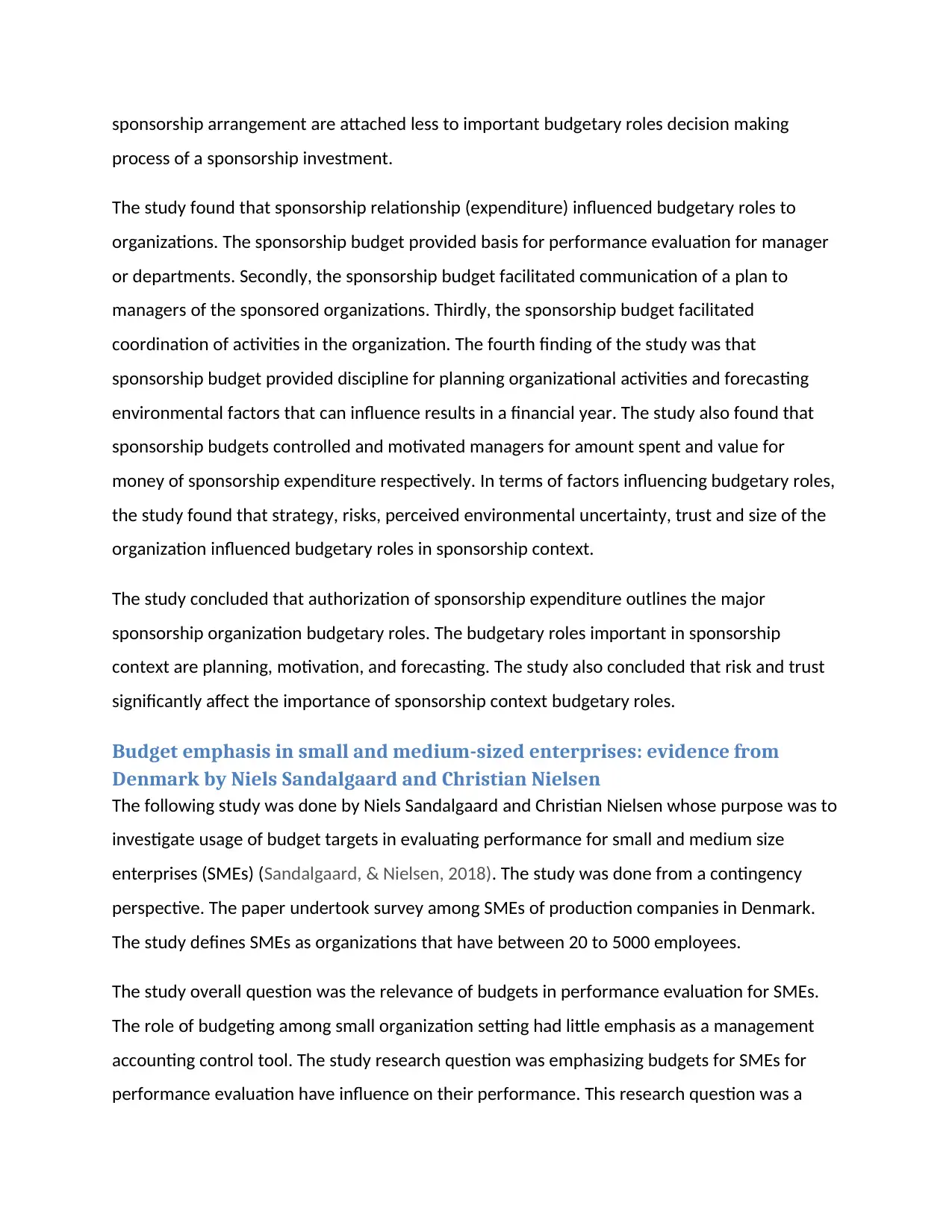
sponsorship arrangement are attached less to important budgetary roles decision making
process of a sponsorship investment.
The study found that sponsorship relationship (expenditure) influenced budgetary roles to
organizations. The sponsorship budget provided basis for performance evaluation for manager
or departments. Secondly, the sponsorship budget facilitated communication of a plan to
managers of the sponsored organizations. Thirdly, the sponsorship budget facilitated
coordination of activities in the organization. The fourth finding of the study was that
sponsorship budget provided discipline for planning organizational activities and forecasting
environmental factors that can influence results in a financial year. The study also found that
sponsorship budgets controlled and motivated managers for amount spent and value for
money of sponsorship expenditure respectively. In terms of factors influencing budgetary roles,
the study found that strategy, risks, perceived environmental uncertainty, trust and size of the
organization influenced budgetary roles in sponsorship context.
The study concluded that authorization of sponsorship expenditure outlines the major
sponsorship organization budgetary roles. The budgetary roles important in sponsorship
context are planning, motivation, and forecasting. The study also concluded that risk and trust
significantly affect the importance of sponsorship context budgetary roles.
Budget emphasis in small and medium-sized enterprises: evidence from
Denmark by Niels Sandalgaard and Christian Nielsen
The following study was done by Niels Sandalgaard and Christian Nielsen whose purpose was to
investigate usage of budget targets in evaluating performance for small and medium size
enterprises (SMEs) (Sandalgaard, & Nielsen, 2018). The study was done from a contingency
perspective. The paper undertook survey among SMEs of production companies in Denmark.
The study defines SMEs as organizations that have between 20 to 5000 employees.
The study overall question was the relevance of budgets in performance evaluation for SMEs.
The role of budgeting among small organization setting had little emphasis as a management
accounting control tool. The study research question was emphasizing budgets for SMEs for
performance evaluation have influence on their performance. This research question was a
process of a sponsorship investment.
The study found that sponsorship relationship (expenditure) influenced budgetary roles to
organizations. The sponsorship budget provided basis for performance evaluation for manager
or departments. Secondly, the sponsorship budget facilitated communication of a plan to
managers of the sponsored organizations. Thirdly, the sponsorship budget facilitated
coordination of activities in the organization. The fourth finding of the study was that
sponsorship budget provided discipline for planning organizational activities and forecasting
environmental factors that can influence results in a financial year. The study also found that
sponsorship budgets controlled and motivated managers for amount spent and value for
money of sponsorship expenditure respectively. In terms of factors influencing budgetary roles,
the study found that strategy, risks, perceived environmental uncertainty, trust and size of the
organization influenced budgetary roles in sponsorship context.
The study concluded that authorization of sponsorship expenditure outlines the major
sponsorship organization budgetary roles. The budgetary roles important in sponsorship
context are planning, motivation, and forecasting. The study also concluded that risk and trust
significantly affect the importance of sponsorship context budgetary roles.
Budget emphasis in small and medium-sized enterprises: evidence from
Denmark by Niels Sandalgaard and Christian Nielsen
The following study was done by Niels Sandalgaard and Christian Nielsen whose purpose was to
investigate usage of budget targets in evaluating performance for small and medium size
enterprises (SMEs) (Sandalgaard, & Nielsen, 2018). The study was done from a contingency
perspective. The paper undertook survey among SMEs of production companies in Denmark.
The study defines SMEs as organizations that have between 20 to 5000 employees.
The study overall question was the relevance of budgets in performance evaluation for SMEs.
The role of budgeting among small organization setting had little emphasis as a management
accounting control tool. The study research question was emphasizing budgets for SMEs for
performance evaluation have influence on their performance. This research question was a
Paraphrase This Document
Need a fresh take? Get an instant paraphrase of this document with our AI Paraphraser
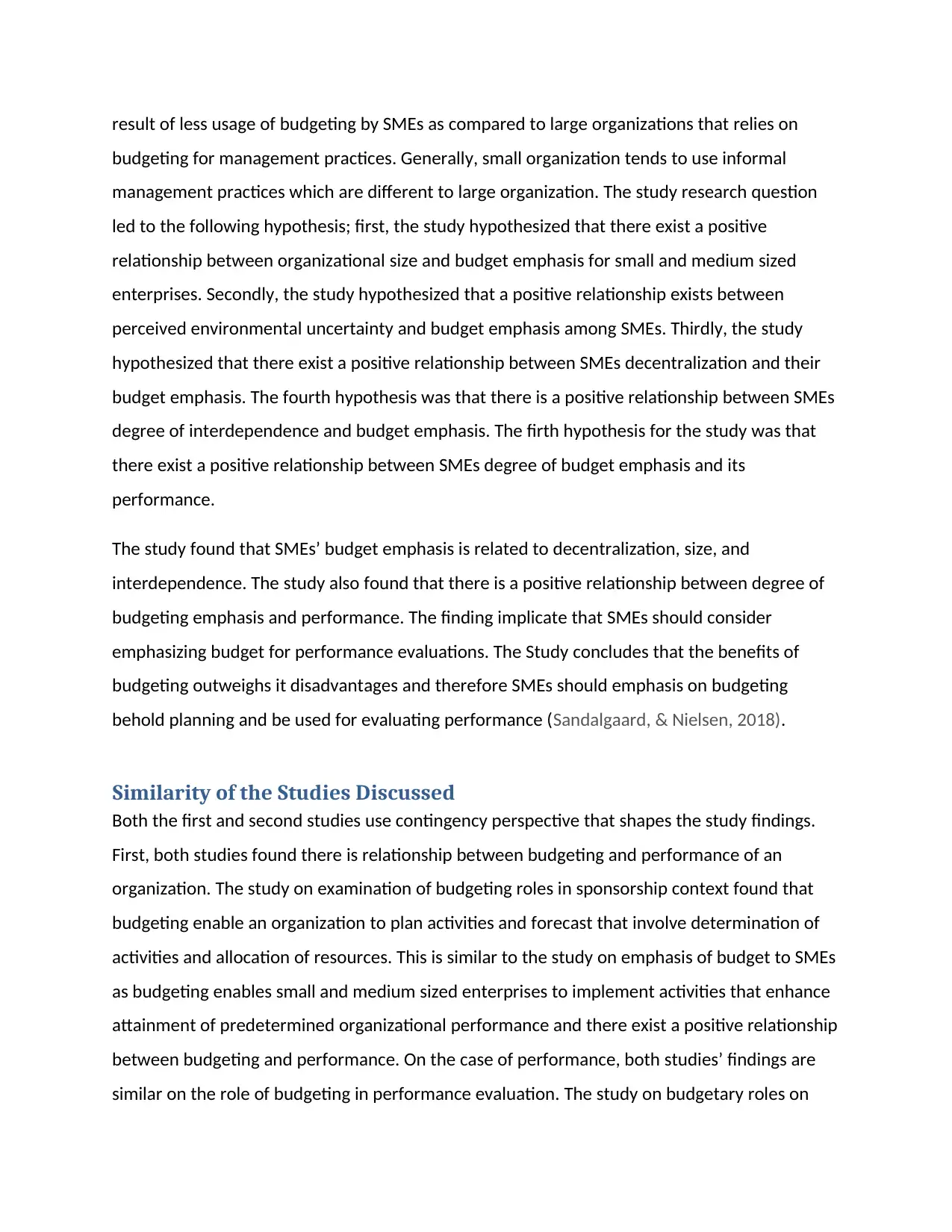
result of less usage of budgeting by SMEs as compared to large organizations that relies on
budgeting for management practices. Generally, small organization tends to use informal
management practices which are different to large organization. The study research question
led to the following hypothesis; first, the study hypothesized that there exist a positive
relationship between organizational size and budget emphasis for small and medium sized
enterprises. Secondly, the study hypothesized that a positive relationship exists between
perceived environmental uncertainty and budget emphasis among SMEs. Thirdly, the study
hypothesized that there exist a positive relationship between SMEs decentralization and their
budget emphasis. The fourth hypothesis was that there is a positive relationship between SMEs
degree of interdependence and budget emphasis. The firth hypothesis for the study was that
there exist a positive relationship between SMEs degree of budget emphasis and its
performance.
The study found that SMEs’ budget emphasis is related to decentralization, size, and
interdependence. The study also found that there is a positive relationship between degree of
budgeting emphasis and performance. The finding implicate that SMEs should consider
emphasizing budget for performance evaluations. The Study concludes that the benefits of
budgeting outweighs it disadvantages and therefore SMEs should emphasis on budgeting
behold planning and be used for evaluating performance (Sandalgaard, & Nielsen, 2018).
Similarity of the Studies Discussed
Both the first and second studies use contingency perspective that shapes the study findings.
First, both studies found there is relationship between budgeting and performance of an
organization. The study on examination of budgeting roles in sponsorship context found that
budgeting enable an organization to plan activities and forecast that involve determination of
activities and allocation of resources. This is similar to the study on emphasis of budget to SMEs
as budgeting enables small and medium sized enterprises to implement activities that enhance
attainment of predetermined organizational performance and there exist a positive relationship
between budgeting and performance. On the case of performance, both studies’ findings are
similar on the role of budgeting in performance evaluation. The study on budgetary roles on
budgeting for management practices. Generally, small organization tends to use informal
management practices which are different to large organization. The study research question
led to the following hypothesis; first, the study hypothesized that there exist a positive
relationship between organizational size and budget emphasis for small and medium sized
enterprises. Secondly, the study hypothesized that a positive relationship exists between
perceived environmental uncertainty and budget emphasis among SMEs. Thirdly, the study
hypothesized that there exist a positive relationship between SMEs decentralization and their
budget emphasis. The fourth hypothesis was that there is a positive relationship between SMEs
degree of interdependence and budget emphasis. The firth hypothesis for the study was that
there exist a positive relationship between SMEs degree of budget emphasis and its
performance.
The study found that SMEs’ budget emphasis is related to decentralization, size, and
interdependence. The study also found that there is a positive relationship between degree of
budgeting emphasis and performance. The finding implicate that SMEs should consider
emphasizing budget for performance evaluations. The Study concludes that the benefits of
budgeting outweighs it disadvantages and therefore SMEs should emphasis on budgeting
behold planning and be used for evaluating performance (Sandalgaard, & Nielsen, 2018).
Similarity of the Studies Discussed
Both the first and second studies use contingency perspective that shapes the study findings.
First, both studies found there is relationship between budgeting and performance of an
organization. The study on examination of budgeting roles in sponsorship context found that
budgeting enable an organization to plan activities and forecast that involve determination of
activities and allocation of resources. This is similar to the study on emphasis of budget to SMEs
as budgeting enables small and medium sized enterprises to implement activities that enhance
attainment of predetermined organizational performance and there exist a positive relationship
between budgeting and performance. On the case of performance, both studies’ findings are
similar on the role of budgeting in performance evaluation. The study on budgetary roles on
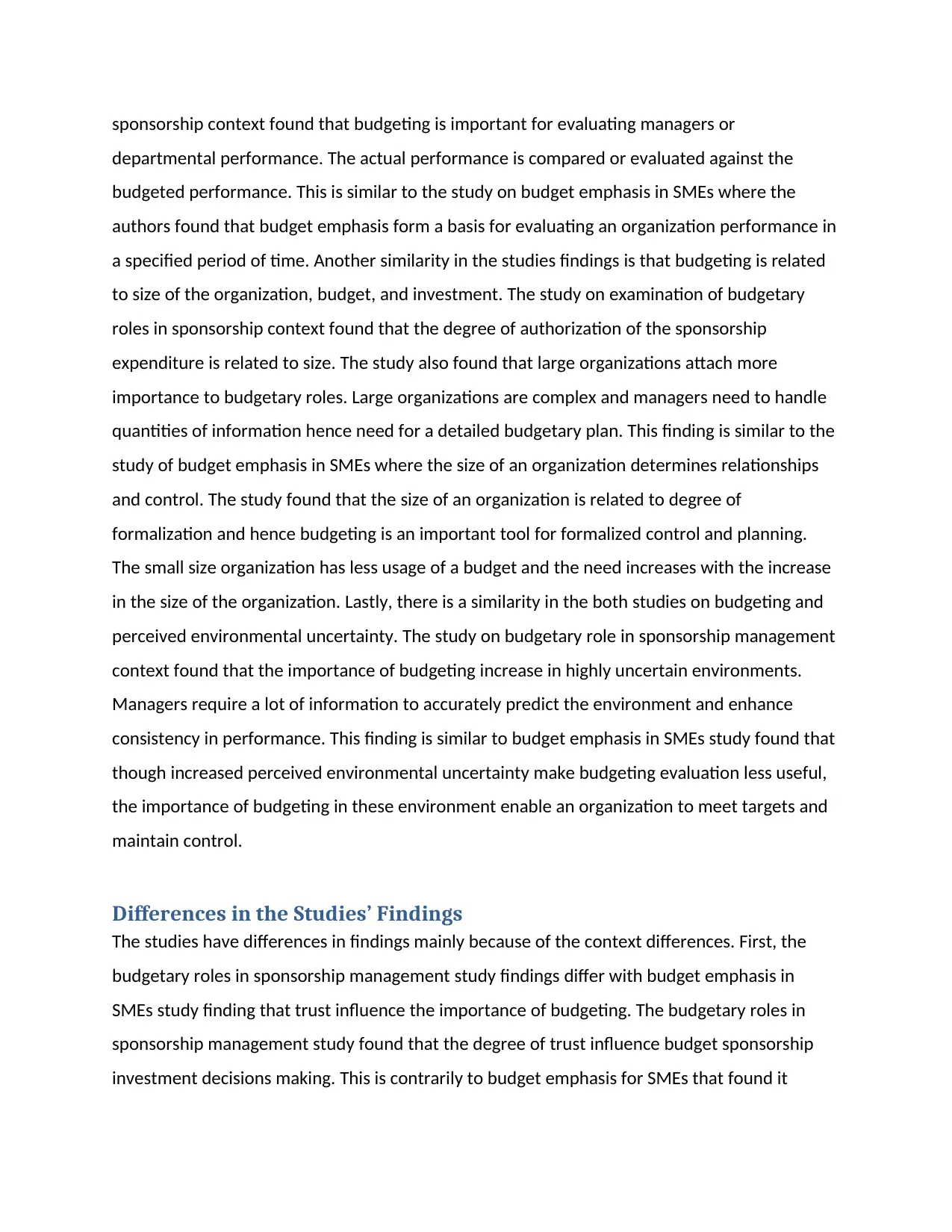
sponsorship context found that budgeting is important for evaluating managers or
departmental performance. The actual performance is compared or evaluated against the
budgeted performance. This is similar to the study on budget emphasis in SMEs where the
authors found that budget emphasis form a basis for evaluating an organization performance in
a specified period of time. Another similarity in the studies findings is that budgeting is related
to size of the organization, budget, and investment. The study on examination of budgetary
roles in sponsorship context found that the degree of authorization of the sponsorship
expenditure is related to size. The study also found that large organizations attach more
importance to budgetary roles. Large organizations are complex and managers need to handle
quantities of information hence need for a detailed budgetary plan. This finding is similar to the
study of budget emphasis in SMEs where the size of an organization determines relationships
and control. The study found that the size of an organization is related to degree of
formalization and hence budgeting is an important tool for formalized control and planning.
The small size organization has less usage of a budget and the need increases with the increase
in the size of the organization. Lastly, there is a similarity in the both studies on budgeting and
perceived environmental uncertainty. The study on budgetary role in sponsorship management
context found that the importance of budgeting increase in highly uncertain environments.
Managers require a lot of information to accurately predict the environment and enhance
consistency in performance. This finding is similar to budget emphasis in SMEs study found that
though increased perceived environmental uncertainty make budgeting evaluation less useful,
the importance of budgeting in these environment enable an organization to meet targets and
maintain control.
Differences in the Studies’ Findings
The studies have differences in findings mainly because of the context differences. First, the
budgetary roles in sponsorship management study findings differ with budget emphasis in
SMEs study finding that trust influence the importance of budgeting. The budgetary roles in
sponsorship management study found that the degree of trust influence budget sponsorship
investment decisions making. This is contrarily to budget emphasis for SMEs that found it
departmental performance. The actual performance is compared or evaluated against the
budgeted performance. This is similar to the study on budget emphasis in SMEs where the
authors found that budget emphasis form a basis for evaluating an organization performance in
a specified period of time. Another similarity in the studies findings is that budgeting is related
to size of the organization, budget, and investment. The study on examination of budgetary
roles in sponsorship context found that the degree of authorization of the sponsorship
expenditure is related to size. The study also found that large organizations attach more
importance to budgetary roles. Large organizations are complex and managers need to handle
quantities of information hence need for a detailed budgetary plan. This finding is similar to the
study of budget emphasis in SMEs where the size of an organization determines relationships
and control. The study found that the size of an organization is related to degree of
formalization and hence budgeting is an important tool for formalized control and planning.
The small size organization has less usage of a budget and the need increases with the increase
in the size of the organization. Lastly, there is a similarity in the both studies on budgeting and
perceived environmental uncertainty. The study on budgetary role in sponsorship management
context found that the importance of budgeting increase in highly uncertain environments.
Managers require a lot of information to accurately predict the environment and enhance
consistency in performance. This finding is similar to budget emphasis in SMEs study found that
though increased perceived environmental uncertainty make budgeting evaluation less useful,
the importance of budgeting in these environment enable an organization to meet targets and
maintain control.
Differences in the Studies’ Findings
The studies have differences in findings mainly because of the context differences. First, the
budgetary roles in sponsorship management study findings differ with budget emphasis in
SMEs study finding that trust influence the importance of budgeting. The budgetary roles in
sponsorship management study found that the degree of trust influence budget sponsorship
investment decisions making. This is contrarily to budget emphasis for SMEs that found it
⊘ This is a preview!⊘
Do you want full access?
Subscribe today to unlock all pages.

Trusted by 1+ million students worldwide
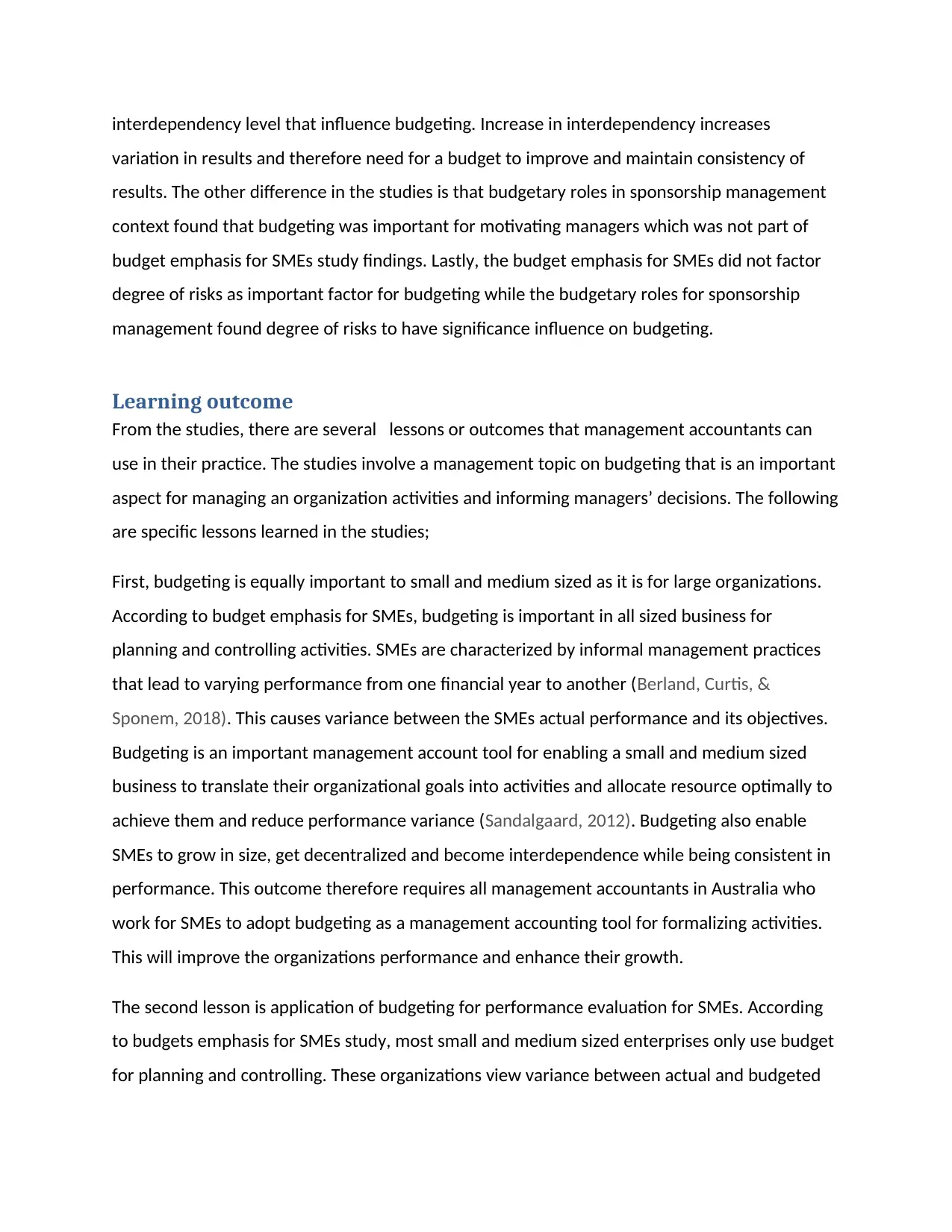
interdependency level that influence budgeting. Increase in interdependency increases
variation in results and therefore need for a budget to improve and maintain consistency of
results. The other difference in the studies is that budgetary roles in sponsorship management
context found that budgeting was important for motivating managers which was not part of
budget emphasis for SMEs study findings. Lastly, the budget emphasis for SMEs did not factor
degree of risks as important factor for budgeting while the budgetary roles for sponsorship
management found degree of risks to have significance influence on budgeting.
Learning outcome
From the studies, there are several lessons or outcomes that management accountants can
use in their practice. The studies involve a management topic on budgeting that is an important
aspect for managing an organization activities and informing managers’ decisions. The following
are specific lessons learned in the studies;
First, budgeting is equally important to small and medium sized as it is for large organizations.
According to budget emphasis for SMEs, budgeting is important in all sized business for
planning and controlling activities. SMEs are characterized by informal management practices
that lead to varying performance from one financial year to another (Berland, Curtis, &
Sponem, 2018). This causes variance between the SMEs actual performance and its objectives.
Budgeting is an important management account tool for enabling a small and medium sized
business to translate their organizational goals into activities and allocate resource optimally to
achieve them and reduce performance variance (Sandalgaard, 2012). Budgeting also enable
SMEs to grow in size, get decentralized and become interdependence while being consistent in
performance. This outcome therefore requires all management accountants in Australia who
work for SMEs to adopt budgeting as a management accounting tool for formalizing activities.
This will improve the organizations performance and enhance their growth.
The second lesson is application of budgeting for performance evaluation for SMEs. According
to budgets emphasis for SMEs study, most small and medium sized enterprises only use budget
for planning and controlling. These organizations view variance between actual and budgeted
variation in results and therefore need for a budget to improve and maintain consistency of
results. The other difference in the studies is that budgetary roles in sponsorship management
context found that budgeting was important for motivating managers which was not part of
budget emphasis for SMEs study findings. Lastly, the budget emphasis for SMEs did not factor
degree of risks as important factor for budgeting while the budgetary roles for sponsorship
management found degree of risks to have significance influence on budgeting.
Learning outcome
From the studies, there are several lessons or outcomes that management accountants can
use in their practice. The studies involve a management topic on budgeting that is an important
aspect for managing an organization activities and informing managers’ decisions. The following
are specific lessons learned in the studies;
First, budgeting is equally important to small and medium sized as it is for large organizations.
According to budget emphasis for SMEs, budgeting is important in all sized business for
planning and controlling activities. SMEs are characterized by informal management practices
that lead to varying performance from one financial year to another (Berland, Curtis, &
Sponem, 2018). This causes variance between the SMEs actual performance and its objectives.
Budgeting is an important management account tool for enabling a small and medium sized
business to translate their organizational goals into activities and allocate resource optimally to
achieve them and reduce performance variance (Sandalgaard, 2012). Budgeting also enable
SMEs to grow in size, get decentralized and become interdependence while being consistent in
performance. This outcome therefore requires all management accountants in Australia who
work for SMEs to adopt budgeting as a management accounting tool for formalizing activities.
This will improve the organizations performance and enhance their growth.
The second lesson is application of budgeting for performance evaluation for SMEs. According
to budgets emphasis for SMEs study, most small and medium sized enterprises only use budget
for planning and controlling. These organizations view variance between actual and budgeted
Paraphrase This Document
Need a fresh take? Get an instant paraphrase of this document with our AI Paraphraser
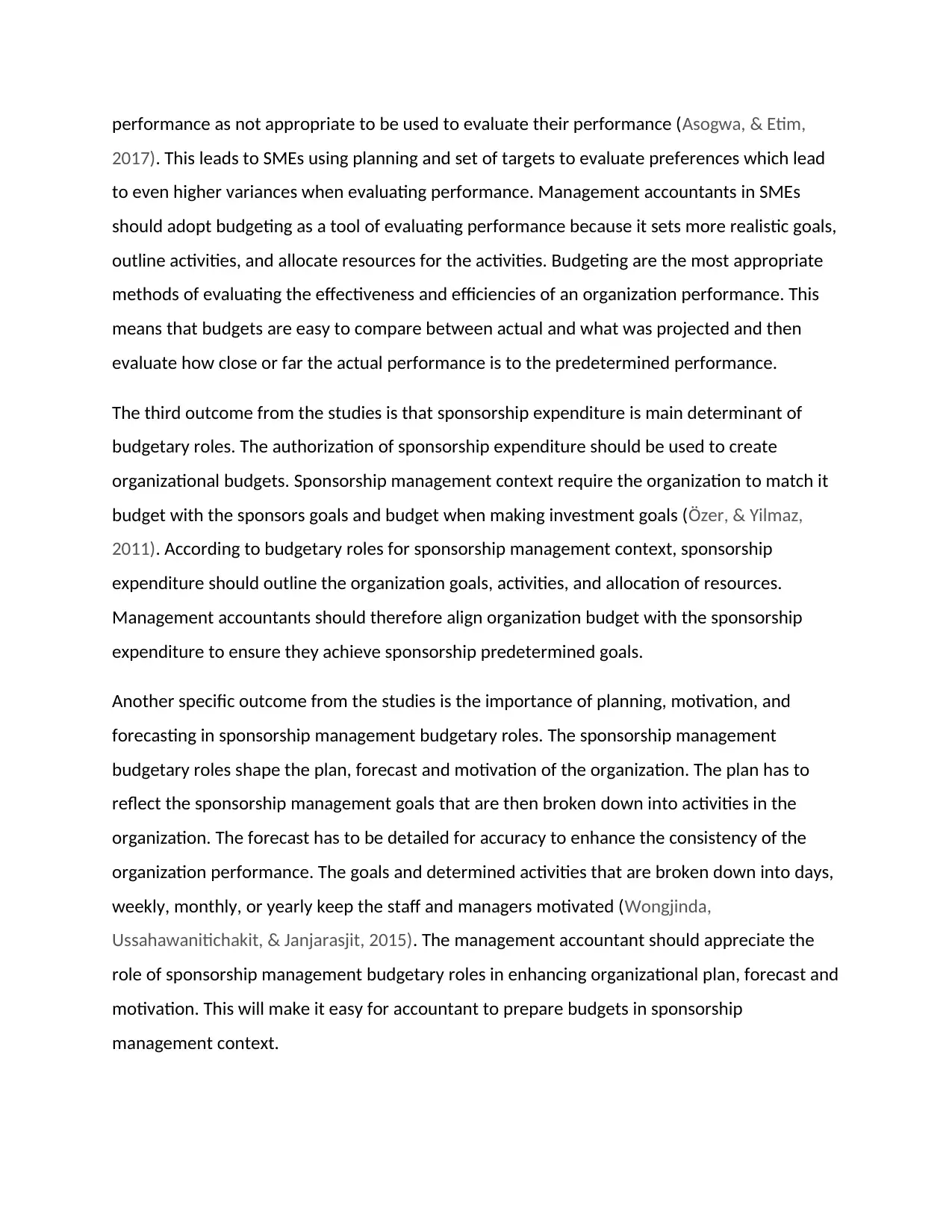
performance as not appropriate to be used to evaluate their performance (Asogwa, & Etim,
2017). This leads to SMEs using planning and set of targets to evaluate preferences which lead
to even higher variances when evaluating performance. Management accountants in SMEs
should adopt budgeting as a tool of evaluating performance because it sets more realistic goals,
outline activities, and allocate resources for the activities. Budgeting are the most appropriate
methods of evaluating the effectiveness and efficiencies of an organization performance. This
means that budgets are easy to compare between actual and what was projected and then
evaluate how close or far the actual performance is to the predetermined performance.
The third outcome from the studies is that sponsorship expenditure is main determinant of
budgetary roles. The authorization of sponsorship expenditure should be used to create
organizational budgets. Sponsorship management context require the organization to match it
budget with the sponsors goals and budget when making investment goals (Özer, & Yilmaz,
2011). According to budgetary roles for sponsorship management context, sponsorship
expenditure should outline the organization goals, activities, and allocation of resources.
Management accountants should therefore align organization budget with the sponsorship
expenditure to ensure they achieve sponsorship predetermined goals.
Another specific outcome from the studies is the importance of planning, motivation, and
forecasting in sponsorship management budgetary roles. The sponsorship management
budgetary roles shape the plan, forecast and motivation of the organization. The plan has to
reflect the sponsorship management goals that are then broken down into activities in the
organization. The forecast has to be detailed for accuracy to enhance the consistency of the
organization performance. The goals and determined activities that are broken down into days,
weekly, monthly, or yearly keep the staff and managers motivated (Wongjinda,
Ussahawanitichakit, & Janjarasjit, 2015). The management accountant should appreciate the
role of sponsorship management budgetary roles in enhancing organizational plan, forecast and
motivation. This will make it easy for accountant to prepare budgets in sponsorship
management context.
2017). This leads to SMEs using planning and set of targets to evaluate preferences which lead
to even higher variances when evaluating performance. Management accountants in SMEs
should adopt budgeting as a tool of evaluating performance because it sets more realistic goals,
outline activities, and allocate resources for the activities. Budgeting are the most appropriate
methods of evaluating the effectiveness and efficiencies of an organization performance. This
means that budgets are easy to compare between actual and what was projected and then
evaluate how close or far the actual performance is to the predetermined performance.
The third outcome from the studies is that sponsorship expenditure is main determinant of
budgetary roles. The authorization of sponsorship expenditure should be used to create
organizational budgets. Sponsorship management context require the organization to match it
budget with the sponsors goals and budget when making investment goals (Özer, & Yilmaz,
2011). According to budgetary roles for sponsorship management context, sponsorship
expenditure should outline the organization goals, activities, and allocation of resources.
Management accountants should therefore align organization budget with the sponsorship
expenditure to ensure they achieve sponsorship predetermined goals.
Another specific outcome from the studies is the importance of planning, motivation, and
forecasting in sponsorship management budgetary roles. The sponsorship management
budgetary roles shape the plan, forecast and motivation of the organization. The plan has to
reflect the sponsorship management goals that are then broken down into activities in the
organization. The forecast has to be detailed for accuracy to enhance the consistency of the
organization performance. The goals and determined activities that are broken down into days,
weekly, monthly, or yearly keep the staff and managers motivated (Wongjinda,
Ussahawanitichakit, & Janjarasjit, 2015). The management accountant should appreciate the
role of sponsorship management budgetary roles in enhancing organizational plan, forecast and
motivation. This will make it easy for accountant to prepare budgets in sponsorship
management context.
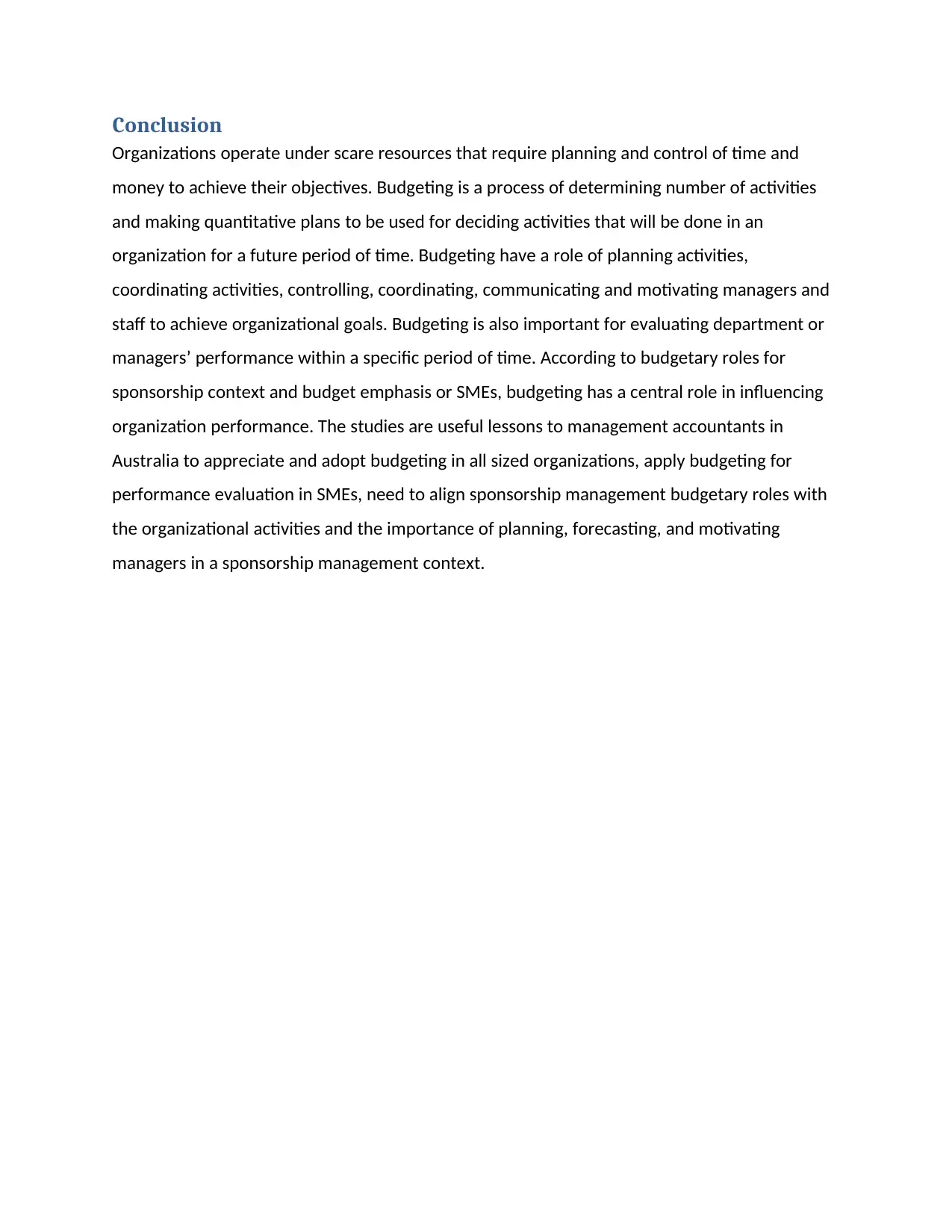
Conclusion
Organizations operate under scare resources that require planning and control of time and
money to achieve their objectives. Budgeting is a process of determining number of activities
and making quantitative plans to be used for deciding activities that will be done in an
organization for a future period of time. Budgeting have a role of planning activities,
coordinating activities, controlling, coordinating, communicating and motivating managers and
staff to achieve organizational goals. Budgeting is also important for evaluating department or
managers’ performance within a specific period of time. According to budgetary roles for
sponsorship context and budget emphasis or SMEs, budgeting has a central role in influencing
organization performance. The studies are useful lessons to management accountants in
Australia to appreciate and adopt budgeting in all sized organizations, apply budgeting for
performance evaluation in SMEs, need to align sponsorship management budgetary roles with
the organizational activities and the importance of planning, forecasting, and motivating
managers in a sponsorship management context.
Organizations operate under scare resources that require planning and control of time and
money to achieve their objectives. Budgeting is a process of determining number of activities
and making quantitative plans to be used for deciding activities that will be done in an
organization for a future period of time. Budgeting have a role of planning activities,
coordinating activities, controlling, coordinating, communicating and motivating managers and
staff to achieve organizational goals. Budgeting is also important for evaluating department or
managers’ performance within a specific period of time. According to budgetary roles for
sponsorship context and budget emphasis or SMEs, budgeting has a central role in influencing
organization performance. The studies are useful lessons to management accountants in
Australia to appreciate and adopt budgeting in all sized organizations, apply budgeting for
performance evaluation in SMEs, need to align sponsorship management budgetary roles with
the organizational activities and the importance of planning, forecasting, and motivating
managers in a sponsorship management context.
⊘ This is a preview!⊘
Do you want full access?
Subscribe today to unlock all pages.

Trusted by 1+ million students worldwide
1 out of 14
Related Documents
Your All-in-One AI-Powered Toolkit for Academic Success.
+13062052269
info@desklib.com
Available 24*7 on WhatsApp / Email
![[object Object]](/_next/static/media/star-bottom.7253800d.svg)
Unlock your academic potential
Copyright © 2020–2026 A2Z Services. All Rights Reserved. Developed and managed by ZUCOL.





